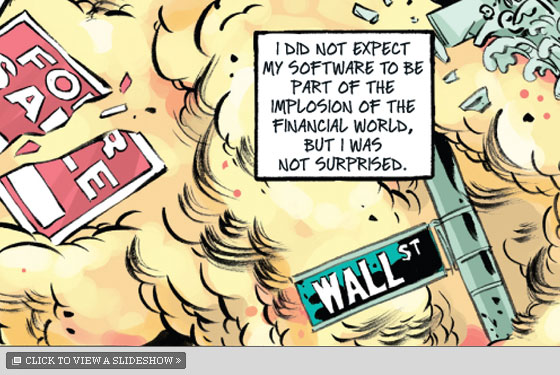
In New York Magazine, Michael Osinsky, the creator of a software program that facilitated mortgage securitization, looks back on his career, "My Manhattan Project: How I helped build the bomb that blew up Wall Street." (Hat Tip: Real Clear Markets). An interesting read, though the title overstates the case. This excerpt from the piece is closer to the mark:
The packaging of heterogeneous home mortgages into uniform securities that can be accurately priced and exchanged has been singled out by many critics as one of the root causes of the mess we’re in. I don’t completely disagree. But in my view, and of course I’m inescapably biased, there’s nothing inherently flawed about securitization. Done correctly and conservatively, it increases the efficiency with which banks can loan money and tailor risks to the needs of investors. Once upon a time, this seemed like a very good idea, and it might well again, provided banks don’t resume writing mortgages to people who can’t afford them.
Osinksy is right that there's nothing inherently wrong with securitization, and critics of the packaging of heterogeneous mortgages are right too. A security created from a pool of homogeneous mortgages -- say, $200k 30 year fixed rate mortgages with loan-to-value ratios of 80% and borrower credit scores of 720+ -- wouldn't be inherently flawed. It would also be a lot easier for investors to price.
The image above is from the New York Magazine article.



3 comments:
The problem with securitization is that it allows for even greater leveraging of the issuing company's assets. Too much leverage can kill.
A side negative is the removal of the assets from the issuers' portfolios which made the underwriters of the loans very casual about checking applications for accuracy.
If you're not going to hold and be responible for the long-term repayment of the loans all you care about is originating as many mortgages as possible as quickly as you can.
In order for the incentives of the originators of securitized mortgages to be aligned with the investors in mortgage-backed securities, a significant portion of the originators' compensation needs to be deferred and tied to the performance of the mortgages they issue. More broadly, the same sort of performance-based, deferred compensation is needed to align the interests of the employees of Wall Street firms and those firms' shareholders.
Re: Wall Street comp
It would be nice to see some kind of way to enforce executive compensation (at least with certain companies) to be paid in common stock dividend through some kind of custodial trust set up from where executives recieve their pay as dividends from the trust, and as they stay with the company longer (assuming it prospers, they do well, etc) they earn more of the shares in the trust "for keeps". I don't know exactly how it would be fleshed out, but something like that would align executives with the shareholders a lot more than huge one time cash payments for a few months work. Make the exec's become the true owners of the company in the same way the little guys are, and have them get paid the same way.
Post a Comment